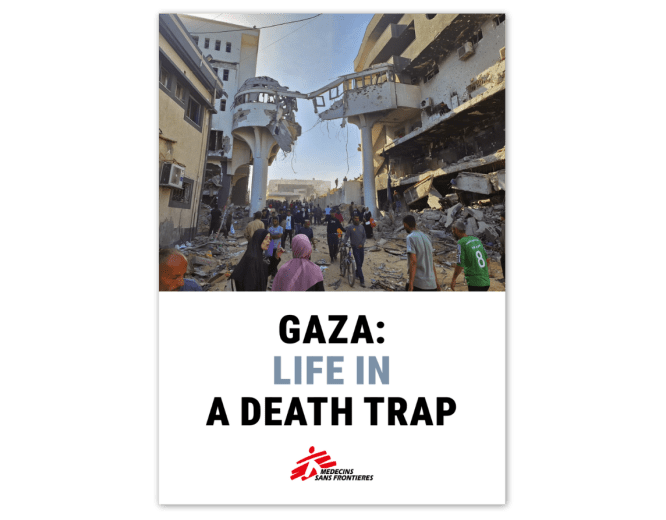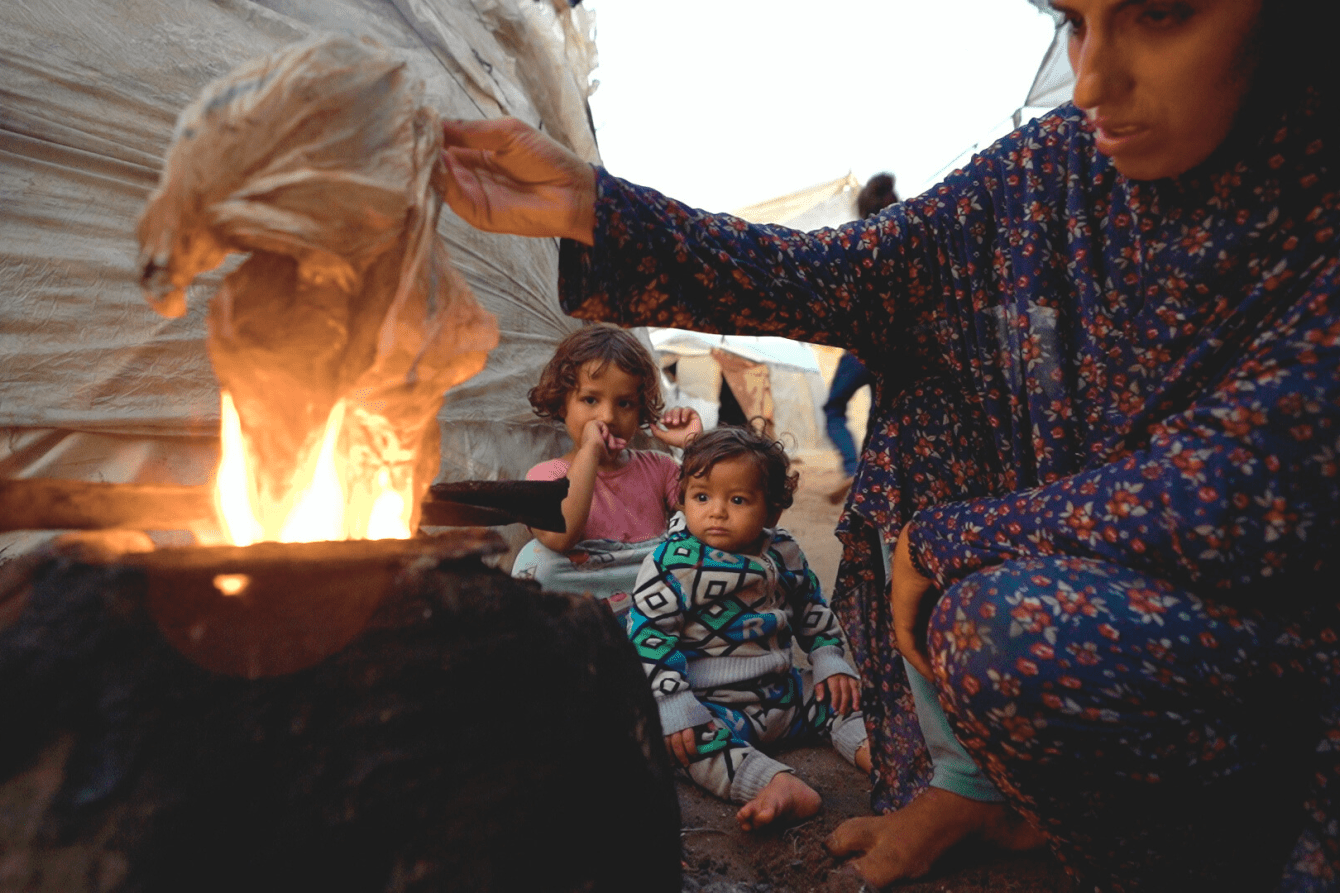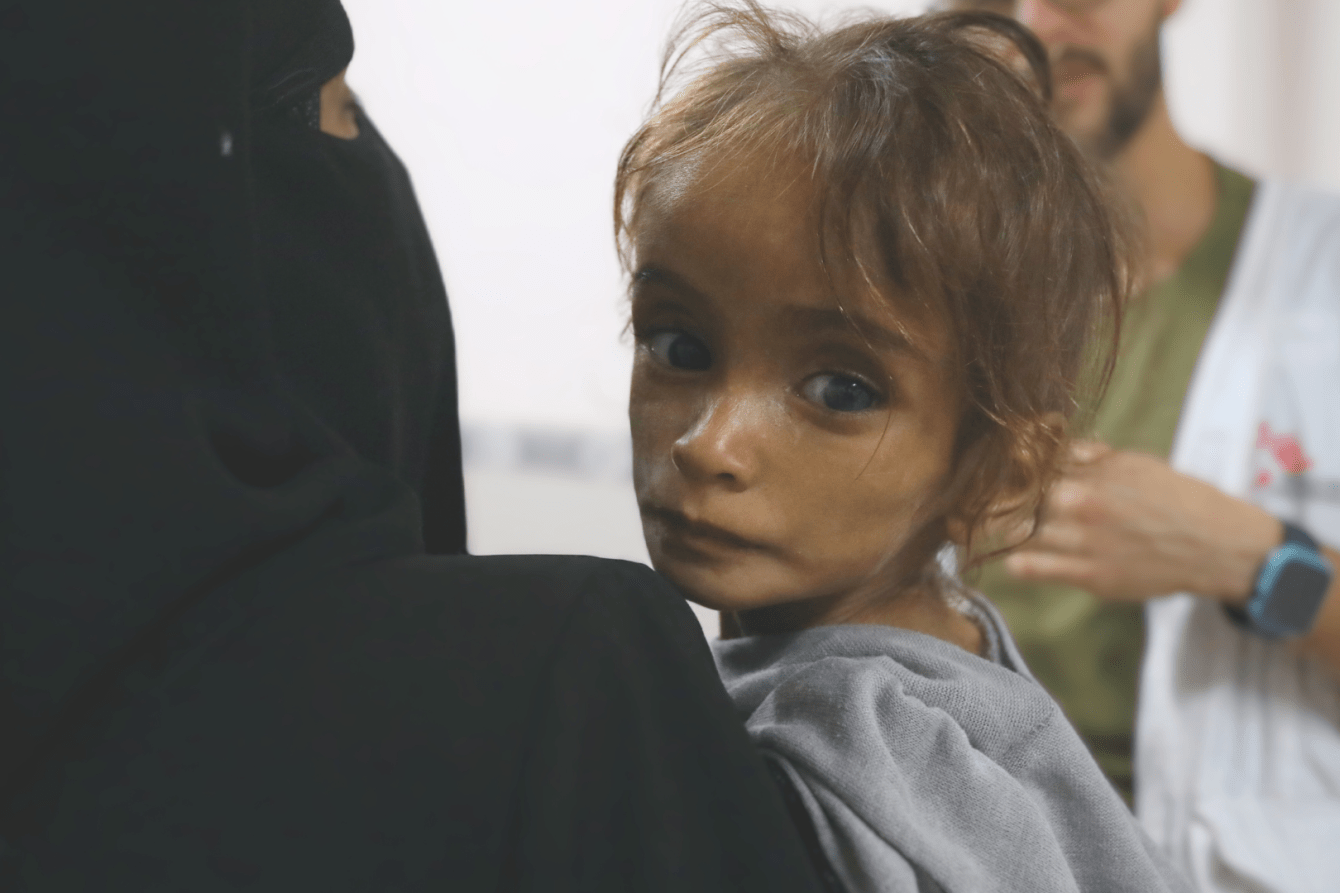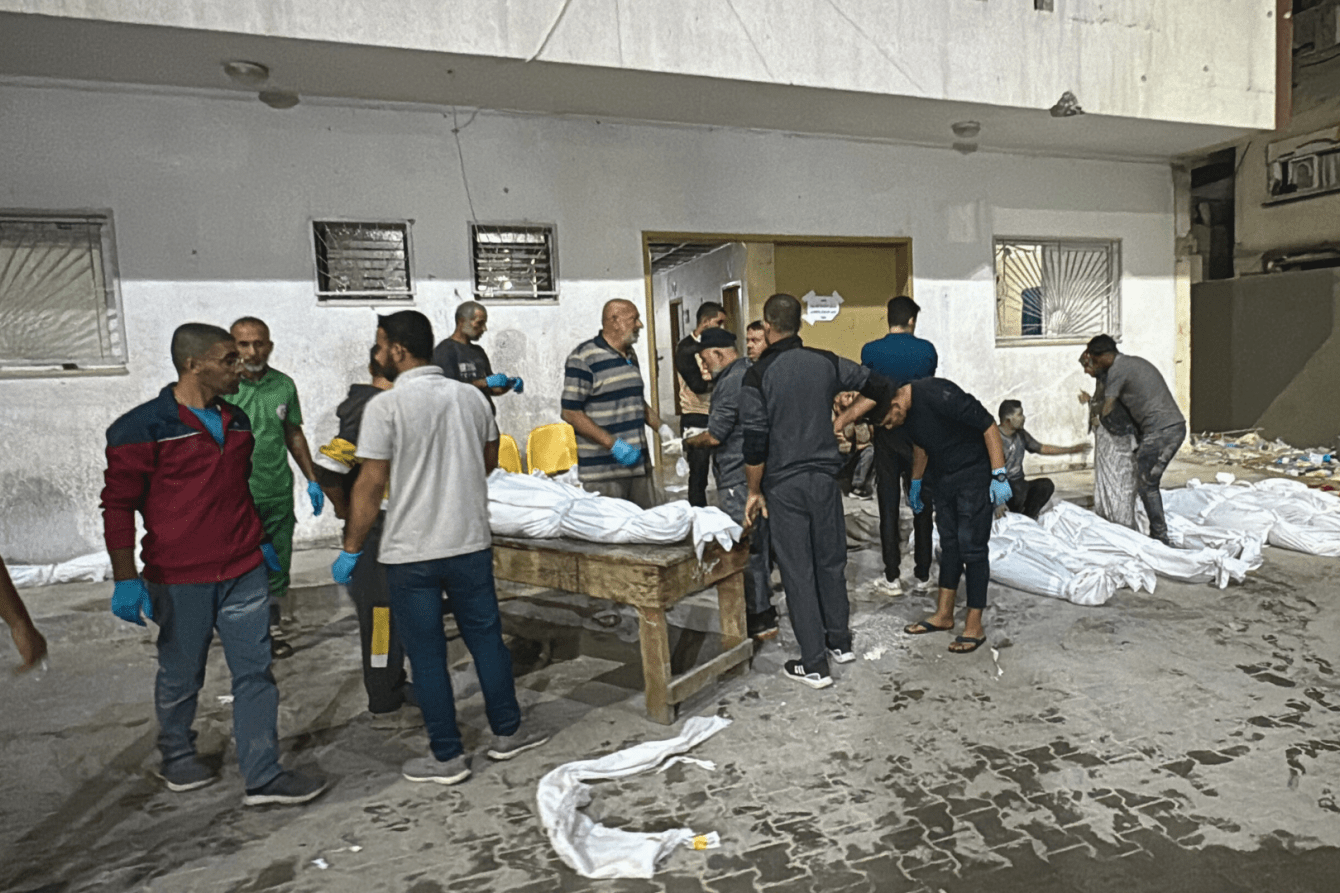Repeated Israeli military attacks on Palestinian civilians over the last 14 months, the dismantling of the health care system and other essential infrastructure, the suffocating siege, and the systematic denial of humanitarian assistance are destroying the conditions of life in Gaza, according to a new Doctors Without Borders/Médecins Sans Frontières (MSF) report, "Gaza: Life in a Death Trap."
The international medical humanitarian organization is urgently calling on all parties, once again, for an immediate ceasefire to save lives and enable the flow of humanitarian aid. Israel must stop its targeted and indiscriminate attacks against civilians, and its allies must act without delay to protect the lives of Palestinians and uphold the rules of war.
"People in Gaza are struggling to survive apocalyptic conditions, but nowhere is safe, no one is spared, and there is no exit from this shattered enclave," said Christopher Lockyear, MSF secretary general, who visited Gaza earlier this year. The recent military offensive in the north is a stark illustration of the brutal war the Israeli forces are waging on Gaza, and we are seeing clear signs of ethnic cleansing as Palestinians are forcibly displaced, trapped, and bombed.”

Gaza: Life in a Death Trap
Bearing witness to 14 months of repeated attacks on civilians, the dismantling of essential civilian infrastructure including health care facilities, and a systematic denial of humanitarian assistance in Gaza.
Bearing witness in Gaza
"What our medical teams have witnessed on the ground throughout this conflict is consistent with the descriptions provided by an increasing number of legal experts and organizations concluding that genocide is taking place in Gaza,” Lockyear said. “While we don't have legal authority to establish intentionality, the signs of ethnic cleansing and the ongoing devastation—including mass killings, severe physical and mental health injuries, forced displacement, and impossible conditions of life for Palestinians under siege and bombardment—are undeniable."
In response to the horrific attacks carried out by Hamas and other armed groups in Israel on October 7, 2023—in which 1,200 people were killed and 251 people were taken hostage—Israeli forces are crushing the entire population of Gaza. Israel's all-out war on Gaza has reportedly killed more than 45,000 people, according to the Ministry of Health, including eight MSF colleagues. The number of excess deaths related to the war is likely much higher due to the impacts of a collapsed health care system, disease outbreaks, and severely limited access to food, water, and shelter. The United Nations estimated earlier this year that more than 10,000 bodies remained buried under the rubble.
Israeli forces have on numerous occasions prevented essential items such as food, water, and medical supplies from entering the Strip, as well as blocked, denied, and delayed humanitarian assistance, as documented in the report. Some 1.9 million people—90 percent of the entire population of the Strip—have been forcibly displaced, many forced to move multiple times.

A decimated health care system
Fewer than half of Gaza's 36 hospitals are even partially functional, and the health care system lies in ruins. During the one-year period covered by the report—from October 2023 to October 2024—MSF staff alone have endured 41 attacks and violent incidents, including airstrikes, shelling, and violent incursions in health facilities; direct fire on the organization’s shelters and convoys; and arbitrary detention of colleagues by Israeli forces. MSF medical personnel and patients have been forced to evacuate hospitals and health facilities on 17 separate occasions, often literally running for their lives. Warring parties have conducted hostilities near medical facilities, endangering patients, caretakers, and medical staff.
Meanwhile, Palestinians' physical and mental health injuries are overwhelming, and the needs continue to grow. MSF-supported facilities have carried out at least 27,500 consultations for violence-related injuries and 7,500 surgical interventions. People are suffering from war wounds as well as chronic diseases, made worse when they cannot access essential health care services and medicines.

Unbearable conditions of displacement
Israel’s forced displacement has pushed people into unbearable and unhygienic living conditions in which diseases can spread rapidly. As a result, MSF teams are treating high numbers of people for illnesses like skin diseases, respiratory infections, and diarrhea—all of which are expected to increase as winter temperatures drop. Children are missing out on crucial immunizations, leaving them vulnerable to diseases like measles and polio. MSF has observed an increase in the number of malnutrition cases; however, it is impossible to carry out a full malnutrition screening in Gaza due to widespread insecurity and the lack of proper deconfliction measures.

Medical evacuations denied
As medical care options dwindle in Gaza, Israel has made it even more difficult for people to be medically evacuated. Between the closure of the Rafah crossing in early May 2024 and September 2024, Israeli authorities have only authorized the evacuations of 229 patients—which amounts to 1.6 percent of those who needed it at that time. This is a drop in the ocean of needs.

The siege of northern Gaza
The situation in northern Gaza is especially dire following Israel's recent scorched earth military offensive that has depopulated large areas and reportedly killed almost 2,000 people. The northern part of the Strip, particularly Jabalia camp, has been besieged again by Israeli forces since October 6, 2024. Israeli authorities have dramatically reduced the quantity of essential aid authorized to enter the north. In October 2024, the amount of supplies reaching the whole Gaza Strip hit its lowest point since the war escalated in October 2023: a daily average of 37 humanitarian trucks entered in October 2024, well below the 500 humanitarian trucks entering Gaza each day before October 7, 2023.
“For more than a year, our medical staff in Gaza have witnessed a relentless campaign by the Israeli forces marked by massive destruction, devastation, and dehumanization,” said Lockyear. “Palestinians have been killed in their homes and in hospital beds. They have been forcibly displaced time and time again to areas that are not safe or healthy. People cannot find even the most basic necessities like food, clean water, medicines, and soap amid a punishing siege and blockade."

States must take urgent action
MSF calls on states, particularly Israel’s closest allies, to end their unconditional support for Israel and fulfill their obligation to prevent genocide in Gaza. Nearly a year ago, on January 26, the International Court of Justice (ICJ) ordered Israel to take “immediate and effective measures to enable the provision of urgently needed basic services and humanitarian assistance to address the adverse conditions of life faced by Palestinians in the Gaza Strip.” Israel has taken no meaningful action to comply with the court order. Instead, Israeli authorities continue to actively block MSF and other humanitarian organizations from providing lifesaving assistance to people trapped under siege and bombardment.
Lockyear breaks down MSF's report
States must leverage their influence to alleviate the suffering of the population and enable a massive scale-up of humanitarian assistance across the Gaza Strip. As the occupying power, Israeli authorities are responsible for ensuring the rapid, unimpeded, and safe delivery of humanitarian aid at the level sufficient to address people’s needs. Instead, Israel's blockade and continued obstruction of aid have made it close to impossible for people in Gaza to access essential goods, including fuel, food, water, and medicines. At the same time, Israel has decided to effectively ban the United Nations Relief and Works Agency for Palestine Refugees in the Near East (UNRWA), which is the largest provider of aid, health care, and other vital services for Palestinians.
How MSF is responding in Gaza
What to know about the humanitarian catastrophe in Gaza and how MSF teams are providing medical and humanitarian aid.
We need a ceasefire
MSF repeats its call for an immediate and sustained ceasefire. The total destruction of Palestinian life in Gaza must stop. MSF is also calling for immediate and safe access to northern Gaza to allow the delivery of humanitarian aid and medical supplies to hospitals. While MSF continues to provide lifesaving care in central and southern Gaza, we call on Israel to end its siege on the territory and open vital land borders, including the Rafah crossing, to enable a massive scale-up of humanitarian and medical aid.
The MSF report notes that even if the Israeli military offensive on Gaza ended today, its long-term impacts would be unprecedented, given the scale of the destruction and the extraordinary challenges of providing health care across the Strip. A staggering number of war-wounded people are at risk of infection, amputation, and permanent disability, and many will require years of rehabilitative care. The cumulative physical toll and mental trauma caused by the extreme violence, loss of family members and homes, repeated forced displacement, and inhumane living conditions will scar generations.
Related stories
Your questions about our work in Gaza, answered
Here are some of the questions frequently asked about our work and mission as it pertains to the ongoing crisis.
Read more
December 19 12:00 AM
Life in the death trap that is Gaza
Israel’s war on Gaza is unraveling the fabric of society in the Strip.
Read more
November 04 10:11 AM
Timeline: One year of bearing witness to all-out war in Gaza
A grim milestone for Palestinians in Gaza suffering under siege and bombardment.
Read more




